- Home
- David Gemmell
Fall of Kings Page 9
Fall of Kings Read online
Page 9
Kassandra laughed. “You think I am some drooling defective who has never climbed a ladder?” Lifting the hem of her dark ankle-length tunic, she almost ran up the ladder, taking Gershom’s hand and leaping over the rail. Andromache followed her.
Safely on the aft deck by the carved steering oar, Andromache immediately glanced around for sight of Helikaon. He was not yet aboard, and she felt a pang of disappointment. The crewmen amidships were hauling aboard cargo: bales of embroidered cloth, sturdy wooden chests, nets full of bread and fruit, and hundreds of small amphorae strung together with twine and padded with straw. Other crewmen then lowered the goods to the hold.
Oniacus vaulted over the deck rail and opened a hatch in the deck by Andromache’s feet. Climbing down to the second oar deck, he called out greetings to the men below. The buzz of conversation continued as the oarsmen began to swap stories and catch up on news of their comrades. All of them seemed cheerful at the prospect of getting under way.
Andromache felt it, too, the exhilaration running through the golden ship. She glanced at Kassandra. The girl’s eyes were bright, her cheeks flushed, and she gazed around with wonder. Because of her strangeness it was easy to forget that Kassandra was little more than a child—and a child about to embark on a great adventure.
“Let us get you both settled,” Gershom said. “We are sailing soon.” He stared hard at Kassandra as if he knew her. “Come,” he said, then led the two women along the central aisle.
Andromache could see some of the Xanthos’ battle scars. There were fire-blackened rows of decking that needed renewal, and part of the starboard rail had been repaired roughly with planks. Three carpenters were busy replacing a section of rail on the port side. They were hammering feverishly.
As she reached the tabernacle, the box at the center of the ship into which the mast sank securely, Andromache saw that a circular wooden seat had been built around the thick oak mast. Plaited ropes had been fixed as handholds. There were half-finished carvings around the edges of the seat.
“We are expecting some rough weather,” Gershom explained. “Even the most experienced sailors can feel nausea in winter storms. The center of the ship heaves about least in rough seas. Come here if you feel unwell or if a storm is looming.”
Andromache nodded and glanced at Kassandra. She looked a little frightened now, and her face had turned pale. Gershom continued on toward the foredeck. Glancing down through open hatches, Andromache could see the oarsmen taking their places in the rowing seats on the lower deck. They were laughing and shouting and passing water skins back and forth. They kept their eyes averted, but she knew they were all aware of the two princesses walking above their heads.
On the foredeck a yellow canopy had been set up to make a private space for the women. Gershom explained that this was where the pair could sleep and spend their days during the voyage. Andromache was used to such arrangements on her trips to and from Thera, but Kassandra looked aghast.
“It’s so small,” she whispered to Andromache.
Andromache was about to point out that the Xanthos’ foredeck was roomier than any other on the Great Green, when silence fell over the ship. She looked back to see Helikaon climbing onto the aft deck. His long dark hair had been tied back in a ponytail, and he was wearing a simple tunic of faded blue. A change came over the crew, a quiet that spoke more of respect than of fear, she believed. She sensed the power in him. It called out directly to her blood, and she tore her gaze away, her face reddening.
Eight burly crewmen ran to the foredeck and, splitting up into two teams of four, untied two long ropes fastened to a thick support. Andromache was intrigued. “What are they doing?” she asked Gershom.
“Getting ready to haul up the anchors. The Xanthos is a heavy beast and hard to launch. We drop the anchors a little way from our mooring place; then, when the men heave on the ropes, it helps pull the hull into the water.”
From all over the King’s Beach Andromache watched men come running. Crewmen from other ships, fishermen, beachmasters, even foreign traders all worked together, putting their shoulders to the golden hull of the Xanthos to push her out into the bay.
For a moment it seemed the ship would not move. Then a voice shouted, “Again!” There was a pause, the timbers creaked, there was a deep groaning sound, the ship moved forward a pace, then another, then suddenly slid into the water, and they were free and afloat. The men on the foredeck tied off their ropes, leaving the stone anchors sluicing water on specially strengthened sections of planking.
The people on the beach cheered as the eighty oars were run out. Then came the deep voice of Oniacus from belowdecks, supplying a rhythmic beat for the rowers.
“One was an oarsman,
They say he was a bad man,
One was a slinger,
And certainly a sad man.
One was a whoreson,
They say he was a madman,
One was a singer
Who never was a glad man.”
The Xanthos moved smoothly away from the beach. The wind was from the north, from Thraki, and the galley made slow progress for a while as the oarsmen battled the strong headwind to get out of the shallow Bay of Troy. The ship moved as if through glue.
“Let’s pick it up, you lazy cowsons!” Oniacus yelled. “Mark of four!”
“One had a sword trick,
One had a treasure,
One had a big prick,
One had the pleasure.”
The oars sliced into the churning water and the ship picked up speed, but it was heavy going, the tide and the wind seeking to drive the great vessel back toward Troy. The two women stood hand in hand watching the Golden City recede slowly behind them.
“I will never see Troy again,” Kassandra said. Andromache had heard her speak those words before, and she had no answer, so she said nothing but put her arm around her and gently turned her so that they faced the way they were traveling.
“We must look forward,” she said, “not dwell on our sadness.” The image of her son’s sleeping face invaded her mind and tore at her heart.
“The ship is very slow,” Kassandra said, staring at the muddy water creeping by below them. She seemed disappointed.
“We will soon be reaching the cape,” Andromache replied. “After that you will see your dolphin bay and King’s Joy.”
The Cape of Tides was the farthest point north they had to travel. After that the ship would turn south for the long voyage down the coast. As the Xanthos cleared the Bay of Troy, the fierce current in the straits snatched at her. The vessel lurched and then picked up speed. The prow began to swing. The skill of the oarsmen came into play, with those on the port side, closest to the land, dipping their blades and pulling hard and those on the starboard lifting their oars clear. The Xanthos straightened. Gershom shouted an order, and six crewmen sprang to haul up the yard. The great sail was unfurled, flapping ferociously against its stays, and as the black horse came into view, the men all shouted. The rowers drew in their oars. The strong north wind filled the sail.
And the Xanthos leaped forward on its journey south.
CHAPTER SIX
THE GREAT CIRCLE
Clouds had begun to gather as the Xanthos sailed south down the coast, heading toward the distant chain of islands known as the Great Circle. Standing at the prow, Gershom stared at the sky, his mood brittle. Though he did not speak of it, he still had nightmares of shipwrecks and drowning in which he clung again to the driftwood with bleeding fingers as the storm raged around him. The big man shivered at the memory and focused on the dark, lowering clouds.
He had been an oarsman on a cargo ship overloaded with copper oxhide ingots. It had broken up in what sailors called a blow. Gershom had been the only survivor. He did not allow himself often to dwell on those dreadful days after the wreck, but he was feeling ill at ease on this voyage.
Gershom glanced back to where the passengers were standing on the rear deck. Andromache was gazing out at the barren i
slands, but the dark-haired, moon-touched girl was staring at him again. He found her gaze unsettling.
Helikaon joined him at the prow. “We’ll find a secluded bay,” he said, “and put out scouts.”
“You think we could be attacked this close to Trojan waters?”
“Probably not, but then, I expect Dios felt safe in a Trojan marketplace.”
Gershom fell silent for a moment. The assassination two days earlier had shocked them all, especially when, under torture, the killer’s son had admitted they were seeking to kill Helikaon. His father’s poor eyesight had led him to attack Dios. Gershom looked at his friend, seeing the hurt in his eyes. “In Egypte,” he said, “the priests say a man’s life is calculated in a celestial sand measure. When the sand runs out, his life ends.”
“We do not hold to that belief,” Helikaon replied. “I wish it had been me in that marketplace.”
“You would prefer to be dead?”
Helikaon shook his head. “I wouldn’t be dead. I would never have walked among the crowds unarmed, and I do not believe a fat merchant would have been fast enough to surprise me.”
Gershom smiled. “Karpophorus surprised you, my friend. But yes, you are a tougher man than Dios ever was. Even so, you are not invulnerable. Do not let arrogance blind you to that fact.”
Helikaon took a deep breath and let it out in a sigh. “I know what you say is true, Gershom. And I did like that fat merchant, so perhaps he would have gotten close to me. We will never know.”
“Was the son executed?”
“Not yet. The other boy was discovered hiding in a warehouse. They are both to die tomorrow. Priam has decided they will burn alive on Dios’ funeral pyre and serve him on the Dark Road.”
“They deserve no less,” Gershom commented. He flicked a glance to the rear deck and cursed softly. “Why does she keep staring at me?”
Helikaon laughed. “She is barely more than a child. Why does she bother you so?”
“I have never been comfortable around the insane. They are so…unpredictable. I saw her in Troy after we docked. She told me that my head was full of mist and that one day I would see clearly. Her words have been going around and around inside my head. What do they mean?”
Helikaon put his hand on Gershom’s shoulder and leaned in close. “One moment you say she is insane, the next you look for meaning in her words? Is that not itself a sign of madness?”
Gershom grunted. “And that is why I am uncomfortable around them. I fear their afflictions can be transmitted like the plague. If I stand too close, I will begin howling at the moon.”
“She is not insane, my friend. Cursed would be more accurate. As a babe she was struck down with the brain fire. Most infants die when afflicted with it, but she recovered. From that moment she was fey.”
“Could she be a true seer?”
Helikaon shrugged. “Kassandra once told me that she and Hektor and I would live forever. Later she said that she would die high in the sky, sitting upon a rock, and that three kings would take to the clouds with her. Does either sound like genuine prophecy to you?”
As Helikaon spoke, the clouds suddenly cleared and brilliant sunlight sparkled upon the sea. Islands of dull gray and brown rock instantly were transformed into shining silver and red gold. Light from the setting sun shone brightly on the undersides of the rain clouds, turning them to glistening coral. Gershom gazed in awestruck wonder at the glory of the sunset.
“Have you ever seen such beauty?” Helikaon whispered.
Gershom was about to agree, when he saw that Helikaon was staring toward the rear of the ship. Gershom turned and saw Andromache, framed in golden light, her yellow dress shimmering as if formed from molten gold. She was smiling and pointing out to sea. Gershom swung his gaze to starboard and saw a dolphin rise from the water, then dive deep.
“It is Cavala,” he heard Kassandra call out happily.
The girl ran to the starboard rail and called out.
The dolphin gave a high-pitched cry, as if answering her, then leaped high into the air, spinning as it rose. Drops of water sprayed from its body, the bright sunlight turning them to diamonds.
It swam alongside the ship for a while, occasionally leaping and diving, but when the Xanthos swung toward a protected bay, it gave a last cry and then disappeared toward the west.
Gershom saw that the dark-haired girl once more was looking at him. She looked so sad, and Gershom was suddenly sorry for her. He lifted his hand and waved at her.
She answered him with a smile, then turned away.
The moon was high and the night cold as Helikaon, wrapped in a heavy coat of dark wool, climbed to the top of the cliffs overlooking the southern sea. Most of the crewmen were sleeping on the beach below, huddled together for warmth. Others, much to the annoyance of the cooks, were crouched close around the early breakfast fires burning on the sand.
It would get much colder yet, Helikaon knew. There would be ice and snow in the Seven Hills and sleet storms along the way. Squatting down away from the wind, he stared out to sea, picturing the route along the coast and then through the Great Circle to Thera. With luck they would encounter no war fleets this late in the year, and few pirate captains would have the nerve to attack the Xanthos.
No, the dangers would come farther west and on the journey home. He sighed and corrected himself. Dangers from the sea, anyway. His thoughts darkened as he recalled the merchant Plouteus. A good, honest man and a shrewd trader. Helikaon never would have considered him a threat, and Gershom was right: The fat merchant would have gotten close enough to make a mortal strike. How many others had been approached, hired, threatened, or suborned? Were there men on this ship waiting for the opportunity to kill him?
He thought again of the merchant’s son Perdiccas. He had been babbling and begging by the time Helikaon had arrived in the cells. One of his eyes had been burned out, and he was bleeding from a score of shallow wounds. The torturers were weary and disgusted with the lack of information. At first they had thought the lad was showing great bravery, but then they had discovered he actually knew nothing and they had been wasting their time and their skills.
Helikaon knelt beside the weeping Perdiccas. “Do you remember me?” he asked softly.
“I do…I am so sorry, lord. So sorry.”
“Why was the attack so hurried? You could have come to my home or waited for nightfall. Why in bright daylight?”
“Father was told you were sailing south either that day or the next. There was no time for planning.” He burst into tears again. “Please forgive me, Helikaon.”
“I forgive you. You stood by your father. What else could you do?”
“Will the torture end now?
“I think that it will.”
“Thank the gods.”
Helikaon had left him then, climbing away from the stench of the dungeons and out into bright sunlight. Perdiccas would not be thanking the gods when they dragged him out and threw him, bound and gagged, onto the funeral pyre of the man he had murdered.
He thought over what the doomed young man had told him. The Mykene had known he was sailing south. Did that mean there was a traitor on board the Xanthos or within Priam’s inner circle? Or could it simply be a sailor bragging to a whore about his coming travels and the whore passing on the information to a Mykene spy?
If it was the latter, there was no harm done. No one on the crew knew their destination, only that they were heading south. If, however, there was a traitor within the palace, the enemy would know he was heading for Thera.
The wind dropped. The eastern sky was growing paler now, the dawn approaching. In that moment Helikaon heard the sound of furtive movement. Stepping swiftly to his left, he drew his sword and spun.
A few paces away a shaggy goat rose on its hind legs and leaped for the shelter of the rocks. Helikaon smiled, sheathed his sword, and made his way back along the cliff top. He paused to gaze down on the Xanthos, his thoughts a mixture of joy and regret. She was the
ship of his dreams, and he still remembered everything about the first day of her voyage, from the clumsy crewmen who dropped an amphora of wine to the sudden wind that blew Khalkeus’ hat over the side. What a day that had been! The crewmen were terrified of sailing the Death Ship. Even Zidantas, who always claimed to fear nothing, was ashen when the storm struck.
Zidantas!
Murdered and beheaded by the Mykene. As Dios had been murdered, and Pausanius, and Argurios and Laodike. And little Dio and his mother, Halysia.
The memories were painful, but there was no anger in him as he stood in the pale light of the predawn. It was as if the ghosts of the past were floating around him, offering silent comfort and continued friendship. “You are growing maudlin,” he warned himself aloud. “The dead are gone, and you are alone here.”
Even so he felt calmer than he had for a long, long time.
On the beach men were stirring, heaping wood on the fires, seeking to banish the cold of the night. Helikaon saw Andromache rise from her blankets. His heartbeat quickened as he remembered the kiss they had shared on the night of battle in the megaron. Angrily he tore his gaze from her. Do not think of that night, he warned himself.
Movement out to sea caught his eye. The crews of two small fishing boats were casting weighted nets in the waters beyond the bay. Helikaon watched them for a while. The boats were old, probably built in the days when the grandfathers of the fishermen were young men, full of hopes and dreams.
Wars come and go, he thought, but there will always be fishermen.
Strolling down the cliff path, he leaped to the sand and made his way to a cookfire. A sailor ladled broth into a wooden bowl and passed it to him. Helikaon thanked him, took a hunk of bread, and walked farther along the beach.
Sitting on a rock, he slowly ate his breakfast. Kassandra came strolling toward him, her cloak trailing in the sand. “I am looking for your friend,” she said. “Where is he?”
After a moment Helikaon realized she meant the goat. “Perhaps he is hiding.”

 Bloodstone
Bloodstone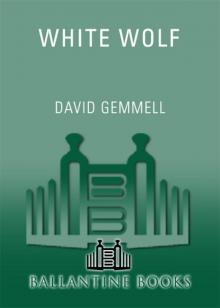 White Wolf
White Wolf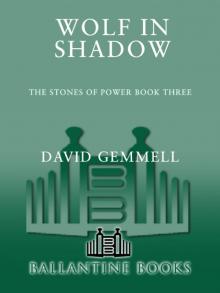 Wolf in Shadow
Wolf in Shadow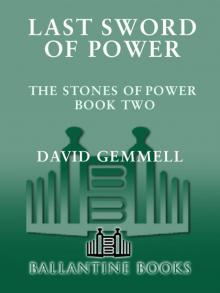 Last Sword of Power
Last Sword of Power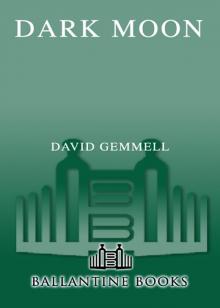 Dark Moon
Dark Moon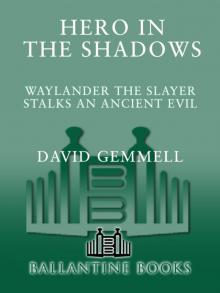 Hero in the Shadows
Hero in the Shadows Gemmell, David - Drenai 09 - Hero In The Shadows
Gemmell, David - Drenai 09 - Hero In The Shadows Waylander
Waylander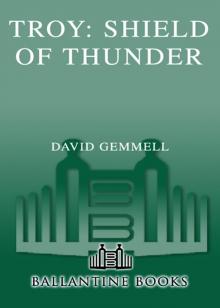 Shield of Thunder
Shield of Thunder Stormrider Stormrider
Stormrider Stormrider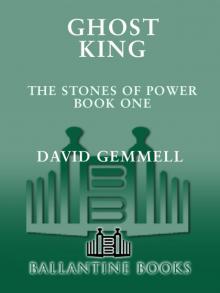 Ghost King
Ghost King Legend
Legend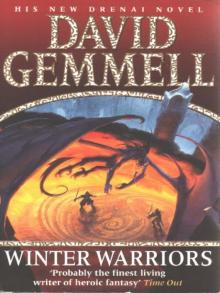 Winter Warriors
Winter Warriors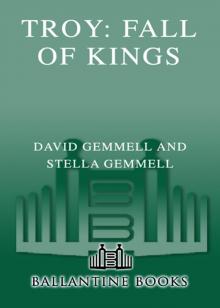 Fall of Kings
Fall of Kings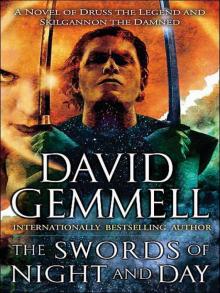 The Swords of Night and Day
The Swords of Night and Day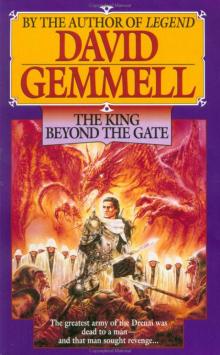 The King Beyond the Gate
The King Beyond the Gate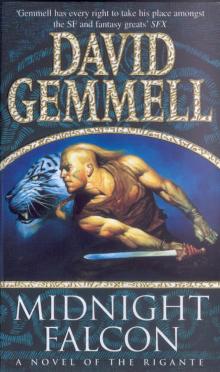 Midnight Falcon
Midnight Falcon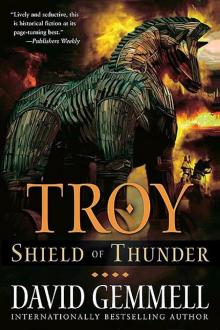 02 - Shield of Thunder
02 - Shield of Thunder In the Realm of the Wolf
In the Realm of the Wolf Ravenheart
Ravenheart The First Chronicles of Druss the Legend
The First Chronicles of Druss the Legend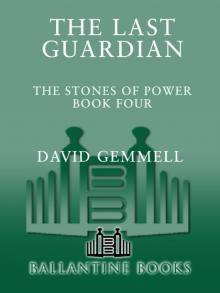 Last Guardian
Last Guardian Stormrider
Stormrider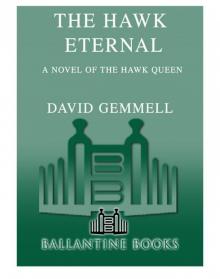 The Hawk Eternal
The Hawk Eternal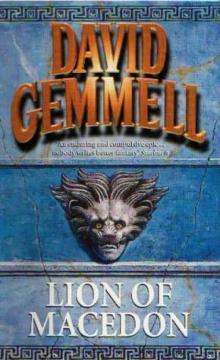 Lion of Macedon
Lion of Macedon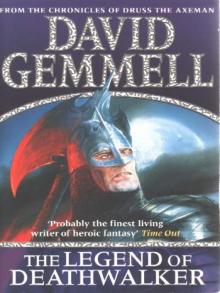 The Legend of Deathwalker
The Legend of Deathwalker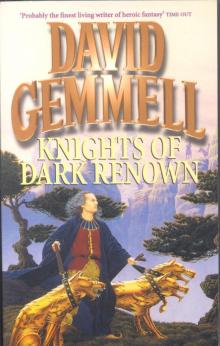 Knights of Dark Renown
Knights of Dark Renown Echoes of the Great Song
Echoes of the Great Song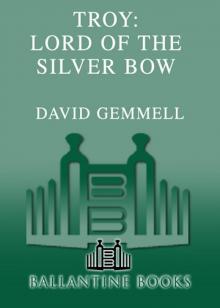 Lord of the Silver Bow
Lord of the Silver Bow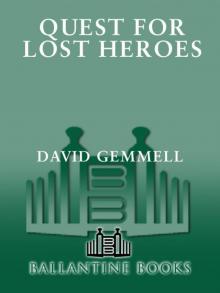 Quest for Lost Heroes
Quest for Lost Heroes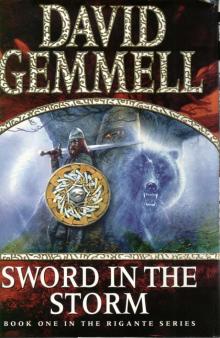 Sword in the Storm
Sword in the Storm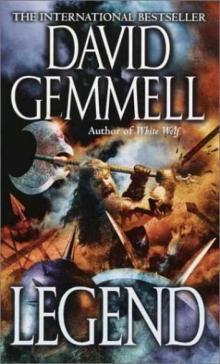 Drenai Saga 01 - Legend
Drenai Saga 01 - Legend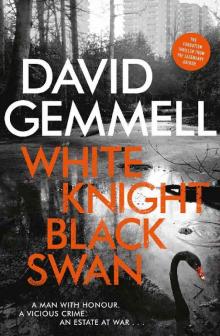 White Knight/Black Swan
White Knight/Black Swan![[Troy 02] - Shield of Thunder Read online](http://i1.bookreadfree.com/i/03/19/troy_02_-_shield_of_thunder_preview.jpg) [Troy 02] - Shield of Thunder
[Troy 02] - Shield of Thunder Lord of the Silver Bow t-1
Lord of the Silver Bow t-1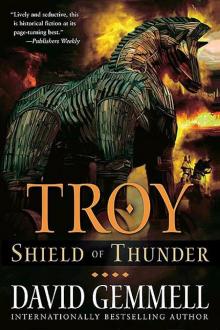 Shield of Thunder t-2
Shield of Thunder t-2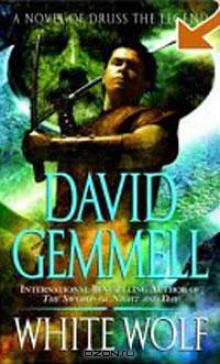 White Wolf: A Novel of Druss the Legend dt-10
White Wolf: A Novel of Druss the Legend dt-10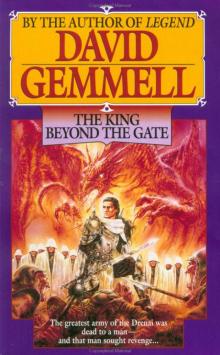 Drenai Saga 02 - The King Beyond the Gate
Drenai Saga 02 - The King Beyond the Gate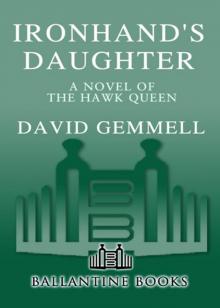 Ironhand's Daughter
Ironhand's Daughter Gemmell, David - Drenai 06 - The First Chronicles of Druss the Legend
Gemmell, David - Drenai 06 - The First Chronicles of Druss the Legend The Last Guardian
The Last Guardian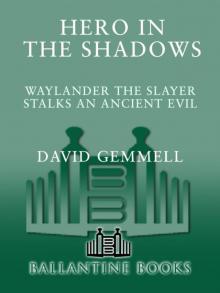 Hero in the Shadows: A Waylander the Slayer Novel
Hero in the Shadows: A Waylander the Slayer Novel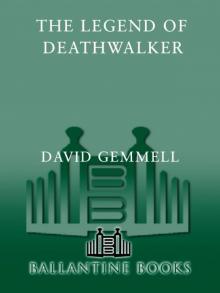 The Legend of the Deathwalker
The Legend of the Deathwalker